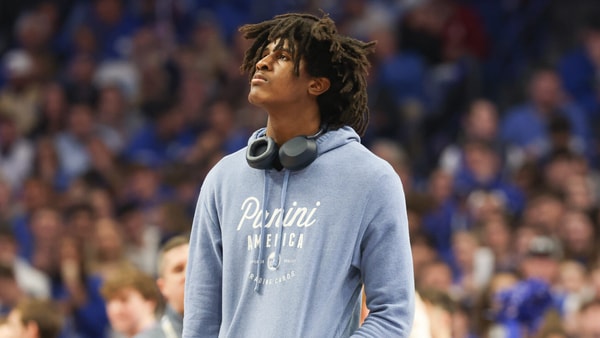John Calipari says "no one" should be able to benefit more from NIL rights than Kentucky

Imagine the opportunities that would have been presented to Anthony Davis if he was allowed to make money off of his basketball abilities when he was at Kentucky. Imagine the number of autograph signings, commercials, and camps that he would have been able to financially benefit from. What about John Wall or DeMarcus Cousins? Karl-Anthony Towns? De’Aaron Fox and Malik Monk? Tyler Ulis and Jamal Murray? Hell, what about Sam Malone and Riley Welch?
College athletics is finally heading toward the path of student-athletes earning money off of their name, image, and likeness (NIL), with the likelihood that those rules could go into effect as early as this summer. It’s a necessary change that is decades overdue and a new component that will completely change how the world views “amateurism” in college sports. But no program in the country should be able to benefit from new NIL laws more than Kentucky Men’s Basketball–and head coach John Calipari knows it.
Earlier on Friday during his first press conference since the conclusion of the 2020-21 season, the very first question that Calipari was asked had to deal with the ever-changing landscape of college athletics. The transfer portal has been blown wide-open while more and more professional basketball routes are being established by the year. That plus the potential of student-athletes making money off of themselves will shift everything from recruiting in the immediate to mapping out rosters five years down the road.
Calipari spoke to the media about how he’s preparing himself and his staff for the incoming changes, saying that he’s already in the developmental process of determining how his staff will approach this situation. Once they get settled, Calipari says there is no reason to believe that Kentucky won’t dominate, especially when it comes to NIL rules.
“Obviously, we have to wait to see exactly what the rules state,” Calipari said about name, image, and likeness. “But no one should be able to do it better for men’s basketball than our program. Two years ago, TV-wise, our ratings before the pandemic would have ranked fourth in the NBA – Golden State, the Lakers, Cleveland with LeBron (James) – would have been above our ratings. So, all the social media stuff and all the stuff we do, and we can do, in my mind it should be the best in the country.”
But the changes go beyond NIL legislation, although UK should still be able to adapt.
Kentucky has lost two players to the transfer portal, however, Calipari has managed to add four of his own in Oscar Tshiebwe, Kellan Grady, CJ Fredrick, and Sahvir Wheeler. Calipari explained that the influx of transfers across the country is nothing to get too nervous over, even if he was against the new transfer rules.
Keep in mind, this is something that every program in the country is dealing with for the first time, as well.
“All of this stuff, the transfer stuff, I was never for,” Calipari said, before adding that “Right now, transfers should not panic anyone in college basketball. Can anybody tell me how many schools have had six or more players transfer this year? It is over 130 schools. One hundred and thirty schools have had over six players transfer. It may be higher now; that was two weeks ago. It could be 150 now.
Top 10
- 1Breaking
Pop Isaacs
Creighton guard commits to Houston
- 2
Final AP Poll
Basketball Top 25 released
- 3Hot
Way-Too-Early Top 25
Looking ahead to 2025-26 hoops
- 4
Nick Saban
Nominated for Emmy
- 5Trending
Hailey Van Lith
Stuns as SI Swimsuit cover model
Get the On3 Top 10 to your inbox every morning
By clicking "Subscribe to Newsletter", I agree to On3's Privacy Notice, Terms, and use of my personal information described therein.
“Kids transferring, it is almost like who is going to do it. OK, I understand and who are we getting? When two years ago if five players transferred from a team everybody would go crazy. ‘The program is crumbling.’ Well, then 150 programs are crumbling. It is a different day really how you evaluate what is going on.”
As for the professional routes such as the G League, Overtime Elite, and Australia’s NBL, the new NIL laws should give Kentucky a fighting chance to beat out those organizations that can offer six- or even seven-figure contracts to 17- and 18-year-olds. But if you ask Coach Cal, UK isn’t competing against them.
“I don’t really think we’re competing [against professional options],” Calipari said. “If a kid has an interest in that, he’s not coming to Kentucky. That’s just my opinion. If they look at this and see the overall picture, we call it the Kentucky Effect. The shoe contracts are more, endorsements are more.
“You may name a player that went to college, and I say to you if he went to one of the pro leagues, what would it have done for him? Now they say, ‘We’re going to build it.’ Well, I’m talking right now. Maybe in five years it’s different, but it isn’t right now. So, yes, they’re out there. Yes, kids are going to do it. Yes, and I’m fine with it. There may be kids that I’ve encouraged to do it. But the others that want this, we’ll be fine.”
College athletics is going to undergo a drastic change, but one of the few constants through it all should be Kentucky’s ability to stay near or at the top.









Discuss This Article
Comments have moved.
Join the conversation and talk about this article and all things Kentucky Sports in the new KSR Message Board.
KSBoard